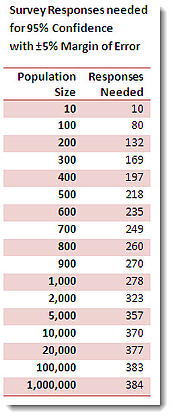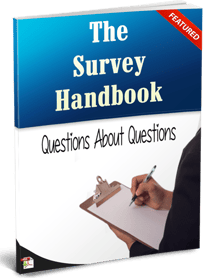To survey people anonymously is not typically a path to business success. Asking for opinions without knowing the source and background of those giving the answer could have decision makers who are not in touch going down a dead end.
This is definitely true when asking for opinions about how to improve a product or service or asking opinions about which is better and what are the preferences.
The answer risks accuracy unless more is known about the context in which the answer is shared. Who has the expertise to answer and who is simply blowing smoke?
The Internet is a giant curtain and the person behind the screen is not apparent. Sticking with quality companies when doing business increases the odds of success.
 To use survey forms online to gather facts and figures can be helpful but only if you understand more thoroughly the complexities.
To use survey forms online to gather facts and figures can be helpful but only if you understand more thoroughly the complexities.
One resource to better understand the effective use of surveys is www.vovici.com. They offer the chart to the right as the recommended sample size for accurate surveys.
Handing out 100 surveys to a group and receiving a 25% response does not appear to be helpful unless it is simply an "idea generator".
How to write good survey questions
Rules for writing good questions are given in classical survey books such as Dillman (1978). A summary of these rules was made by Ten Brink (1992).
Rule 1. Use correct spelling, punctuation and grammar style .
Rule 2. Use specific questions. For example, “did you read a newspaper yesterday?”, instead of “did you read a newspaper?”
Rule 3. Use a short introduction to question of behaviors. In this way you cannot only refresh the memory of the respondent, but also explain what you mean with the concept you are using. For example, with wines, you may not only mean red or white wine, but liqueurs, cordials, sherries, table wines and sparkling wines.
Rule 4. Avoid the use of technical terms and jargon. An exception to this rule are questions that are made for a specific group of respondents, who regularly use jargon, e.g., doctors, lawyers and researchers.
Rule 5. Avoid questions that do not have a single answer. For example, “do you like to walk and ride to school?” Somebody who likes to walk, but does not like to cycle, cannot answer this question in the right way.
Rule 6. Avoid negative phrasing, e.g., “should the school not be improved?” This can lead to confusion and cost more effort to answer the question correctly.
Rule 7. Avoid words and expressions with multiple-meanings, like any and just.
Rule 8. Avoid stereotyping, offensive and emotionally loaded language.
